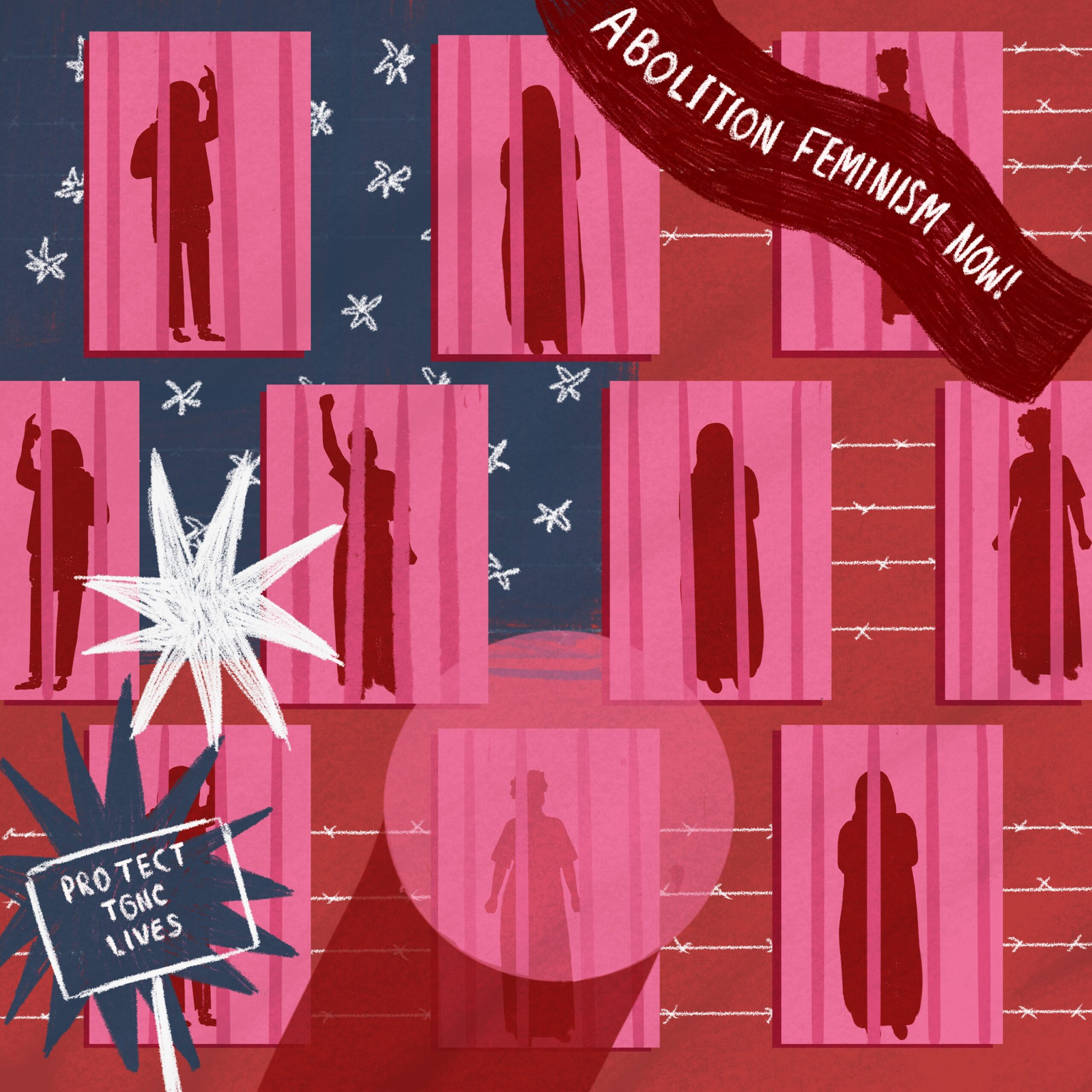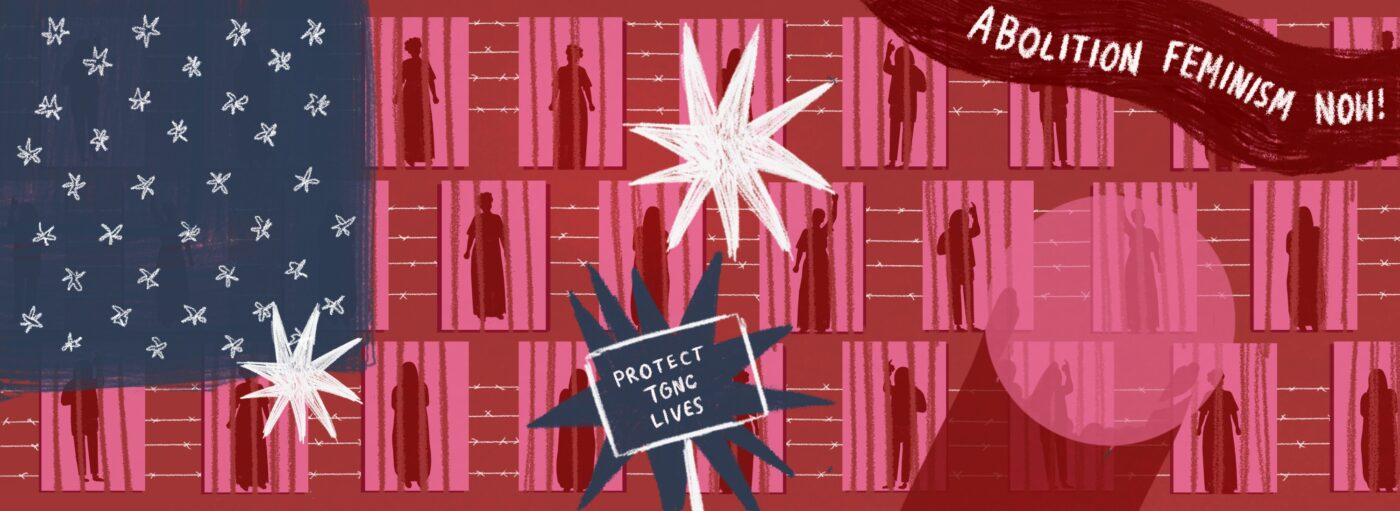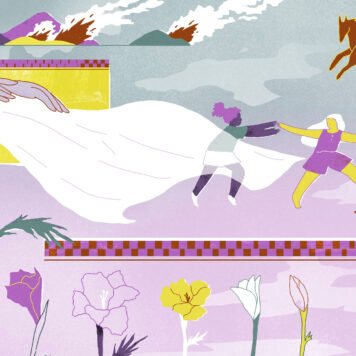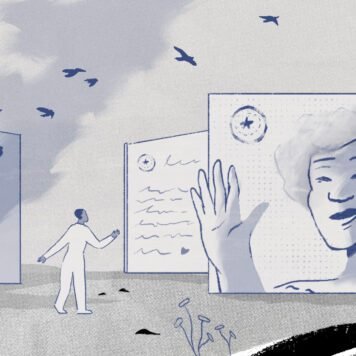Reading Leigh Goodmark’s Imperfect Victims: Criminalized Survivors and the Promise of Abolition Feminism reinforced my abhorrence for the state – something I didn’t think was possible, given my dream job is yelling at the police. Throughout the book, Leigh narrates how the state not only fails victims of gender-based violence but further abuses them.
It was very difficult reading the book, especially in a New York coffee shop where screaming, “I hate the government and you should too!” wasn’t an option. Instead I had to whisper explicits under my breath as I read the stories of Joan Little, Judy Norman, Tiawanda Moore, and other victims of gender-based violence who the state punished for being imperfect victims.
I told Leigh how painful and educational it was reading the book at the beginning of our Zoom conversation and she said, “This is my life, it’s a lot.” Representing victims of gender-based violence is Leigh’s life.
A third-generation lawyer who started the Gender Violence Clinic at the University of Baltimore, which represents incarcerated women and gender-nonconforming survivors of domestic violence, Leigh started the clinic because she says she saw there were plenty of resources for men, but not enough for marginalised genders.
Imperfect Victims is a result of Leigh letting her experience with criminalised survivors inform her perspective of the (in)justice system. She tells me that when she started representing survivors, her point of view was framed by being a white person with a middle-class upbringing who hadn’t studied critical race theory.
However, through representing survivors and hearing their stories, Leigh learned from her clients that “the criminal justice system wasn’t helping survivors – it was actually hurting them in a lot of ways.” Her current politics has also been heavily influenced by Mariame Kaba and Angela Davis, and this evolution is clear when you compare Imperfect Victims to the two books she wrote before it. Her first book was “critical of the legal system but accepted it.” Her second book concluded that “criminalisation of domestic violence was a problem,” but by her own admission, “didn’t mention abolition.”
I’m happy Leigh wrote her third book from an abolitionist point of view, because without it I wouldn’t have learned how the state reinforces racism, transphobia, and the misogynoir through the criminalisation of survivors of gender-based violence. For example, Black women like Marrissa Alexander are viewed as being aggressive and thus less worthy of protection from violence.
I also wouldn’t have learned the term abolition feminism. I love this term because it reinforces the fact that supporting prisons disqualifies you from being a feminist. Did you hear that, Gloria Steinem?
The state criminalises survivors of gender-based violence
I remember first hearing about Cyntoia Brown Long’s story, a woman who was sentenced to prison for murdering a man who paid to have sex with her when she was only 16 years old. The first question that came to mind was: how can a 16 year old be arrested for defending herself from an adult? I assumed this was a rare case – but from reading Imperfect Victims, this is a quite frequent occurrence. For example, “In 2005, the New York Department of Correctional Services found that two-thirds of women incarcerated for killing someone close to them had been abused by that person.”
It became clear that survivors of gender-based violence of all ages are criminalised by the state with regularity, whether they are pre-teens, teenagers, or adults.
Why would the state further abuse people who have already been abused? Of course the state is Dr. Evil pretending to be a protector, but this seems even a little too evil even for Dr. Evil. The answer is the state further abuses survivors because, according to Leigh, the purpose of the injustice system is “policing the behaviour of people who refuse to conform to certain stereotypes about how mainstream society expects victims to act”, aka – being a perfect victim.
Perfect victims don’t defend themselves
So how are perfect victims supposed to act? They are definitely not supposed to defend themselves from their abusers. The damsel-in-distress trope is not just something you see in corny romcoms, it’s state law. Victims of gender violence cannot rely on self-defence laws like “stand your ground” to defend themselves.
“Stand your ground” laws are laws that permit the use of deadly force for self-defence. Yet Marissa Alexander and Brittany Smith are women who were told by the state they cannot use “stand your ground” as a legal defence for protecting themselves.
Marissa Alexander fired a warning shot in her own home to scare away her abusive husband and instead of being protected under the “stand your ground” law, she was sentenced to 20 years in prison. “The prosecutor argued that she [Marissa] should have retreated while being attacked by her estranged abusive husband, even if it meant jumping out of a window”
Brittany invited Todd to her home. He raped her then threatened to murder her family if she told anyone about the rape. Brittany’s brother came to her home to confront the man after Brittany passed a note to a cashier at a gas station to let her mother and brother know she was in danger. Todd attacked Brittany’s brother and Brittany fired warning shots before shooting Todd. Even though she called for help to prevent Todd from dying and had evidence on her body, the judge denied Brittany immunity because her “deadly use of force was not warranted.”
Leigh makes it clear that these women were not able to claim self-defence under “stand your ground” because these laws are in place to protect cis men and not marginalised genders. I would also say they are specifically for white men, but that’s a story for another time. I would however say that by the state deciding who is or not allowed to defend themselves, the state is directly enforcing the gender hierarchy.
Of course this is not surprising because capitalism depends on the maintenance of the gender hierarchy. It does reinforce the notion that the state further abuses victims who defend themselves because the state itself is an abuser.
But an abuser to what end?
During our conversation, Leigh mentions, “intimate partner violence has always been described as one person’s desire to exercise power and control over their intimate partner in the service of patriarchy – and the outcome of that is the person is controlled.” This is exactly what the state does. It criminalises victims of violence who defend themselves to uphold the patriarchy because the patriarchy serves capitalism.
Imperfect victims have a specific identity
Not only does the state criminalise victims of gender violence to serve the patriarchy, but it also does so to maintain the racial socioeconomic hierarchy and transphobia. Ron DeSantis is not the first racist transphobe to use the power of the state to maintain the hierarchy which, once again, capitalism depends on. The police do this every time they come into contact with a victim of gender-based violence.
Subscribe to shado's weekly newsletter
Exclusive event news, job and creative opportunities, first access to tickets and – just in case you missed them – our picks of the week, from inside shado and out.

Imperfect Victims calls out that, “the further a person is from hegemonic norms centred around race, gender identity, and social class, the less likely they are to have their victimisation acknowledged the operation of these norms make victims of colour, low-income victims, and TGNC (transgender and gender nonconforming) victims disproportionately more likely to be arrested.”
If I wasn’t an anarchist already, this sentence would have made me one.
Of course I know the purpose of the police has always been to protect capital and maintain capitalism through the oppression of those who are not white, cis, hetero. The police in the United States specifically originated from slave patrols so their purpose has never been to protect and serve. More like to oppress and punish. Still, knowing the state actively abuses those who’ve already been abused to maintain this dystopian nightmare never crossed my mind.
Reading about the story of Crystalle Crain, a Black woman who was arrested when the police could clearly see bruises inflicted on her by her ex-husband, particularly shocked me. Crystalle’s ex-husband convinced the police that she abused him and they believed him. Crystalle maintained that she was defending herself but she was arrested because Black women are viewed as being more violent and less worthy of protection by the police according to Leigh.
I just can’t imagine seeing a harmed human and concluding they are a perpetrator because they are Black. However, I’m also not a racist police officer whose sole purpose of existence is playing candy crush outside a Popeye’s and maintaining an extremely evil economic system.
Laws enacted to “protect” victims of gender-based violence lead to criminalisation
Crystalle was arrested under a mandatory arrest law, which causes “victims of gender based violence to be arrested if they defend themselves, a partner convinces the police the victim is the perpetrator or if the police can’t determine what happened.” Mandatory arrest laws were supposedly passed to protect victims of gender-based violence, but as we all know, the state will say anything to give itself more power.
I’m assuming everyone knows the state is evil by this point of reading everything I’ve shared from Imperfect Victims. If not, I hope the next paragraph convinces you.
Black feminists “warned that mandatory arrest laws would lead to a higher incarceration rate for women” but states continued to enact them because incarcerating people is something the state likes to do. Especially if those people are not white, cis, or hetero.
Mandatory arrest laws have disproportionately affected Black, Indigenous, and Latin marginalised genders. Imperfect Victims reveals that Black trans women are “ten times as likely to be incarcerated” than the general population after the passage of these laws.
Another legislation that has led to increased incarceration of marginalised genders is the Violence Against Women Act. Given the results of increased incarceration for those who it was meant to protect. Imperfect Victims highlights that “The incarceration rate of women in state prisons increased by 834% between 1978-2015” and this increase is not because of an “increase of criminality in women but to how the criminal (in)justice system treats women”. Specifically relating to being criminalised for being victims of gendered violence. I asked Leigh if these results were accidental or if it was the state’s intention to increase incarceration under the guise of protecting people.
Leigh said that for conservatives it “was white supremacy and maintaining strict racial hierarchies and expanding incarceration”. For anti-violence advocates, it may have not been the case. However, Leigh quotes Alisa Bierria who says: “There is only so long before something can be called an unintended consequence. The criminalisation of gender violence cannot be called unintended anymore because we know the impact.”
Abolition feminism is the way forward
Given that the state only further abuses imperfect victims of gender-based violence, Imperfect Victims offers abolition feminism as the only solution to prevent criminalisation of victims. The book states: “Abolitionist feminists understand the violence inherent in the carceral system and share the abolitionist commitment to rejecting punitive structures and building institutions that will facilitate safety, health, and well-being.”
I agree with the book – abolition is the only way we will all be free from oppression. However, I did ask Leigh why she needed to name abolition feminism instead of feminism alone. I asked this question based on Mariame Kaba’s insistence that feminists can’t be carceral.
Leigh insists that it is important to name abolition feminism because the “mainstream feminist movement doesn’t understand that feminists can’t support prisons.” I would argue that the mainstream feminist movement isn’t really feminist with its glorification of the #girlboss and Barbie, but let me get back to the point.
After Gloria Steinem’s support of a feminist prison in New York, which was denounced by Mariame Kaba and Angela Davis, I agree with Leigh. I think it’s important to restate that feminism must be abolitionist; somewhere along the creation of the #feminist shirt, this was forgotten. Forgotten isn’t the right term really, co-opted by capitalism is the phrase.
What can you do?
- Support National Bail Out to bailout Black mothers
- Support and Learn from Survived and Punished an organisation seeking to end criminalization of survivors gender based violence
- Read We Do This ‘Til We Free Us: Abolitionist Organizing and Transforming Justice by Mariame Kaba to learn more about prison abolition
- Read Are Prisons Obsolete? by Angela Davis to learn more about why we should get rid of prisons
- Read Why police will never be the answer to gendered violence










